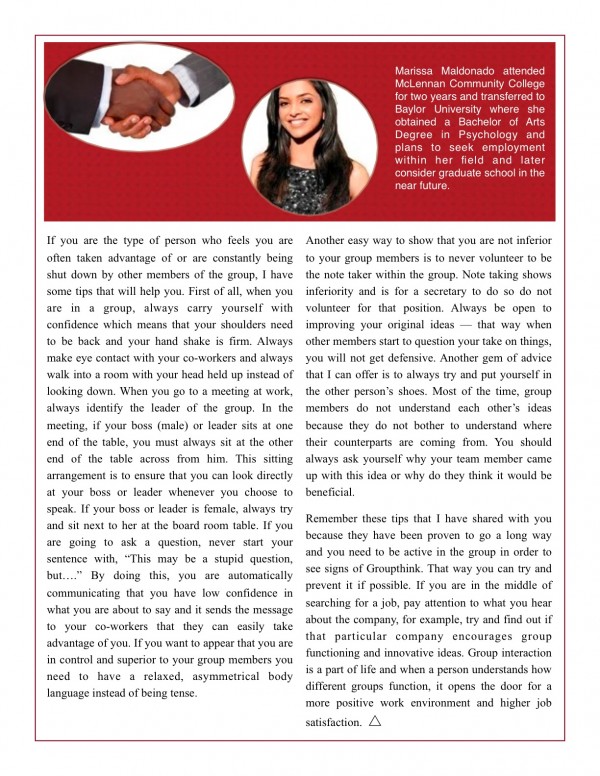
by cjxpadmin | Jul 2, 2012 | July 2012 Magzine
Getting Out and About Town!
It’s a small world after all, at least that’s what Disney tells us, but when you live in a small town, or you just moved to somewhere new, the world gets even tinier! You’re looking to meet people, go out, try new things, but you can’t find anyone to meet, anywhere to go, or anything new to try. So we’ve come up with a list of places and things where you can possibly do all three!
Local Colleges
If you live in a college town, you are in luck! Colleges are constantly doing things to keep their students and the local populace entertained. They put on plays, hold video game nights, and various other events throughout the month so that they can keep the students busy. Idle hands are the devil’s playground after all. Finding what to do is as easy as pulling up a local calendar online, or heading to their main building to pick up a school paper. Most of the things that the schools put on are usually free for students and at a reduced cost to visitors!
City Visitors Center
Most cities have a Visitor’s Center. If not, you can usually go to the City Hall or post office and get the same information. You can find out about local events and festivals, maybe look for a historical site or two. They will also have recommendations for local restaurants, bars, and things that you can do with the kids! If you’re lucky, you can get a membership card that gives you discounts on local attractions, which is especially great if you plan on doing a lot of visiting within the city.
Volunteer
So you’re looking to meet new people? Well, you can’t go wrong with volunteering. By volunteering in a place that interests you, you will be doing two things: 1. Making the world a better place. 2. Meeting people who have some of the same values you do! How easy is it to walk in a room and volunteer, be introduced to other people, then get to know them while working alongside of them? It’s like rolling off a log, it’s that easy. You’ll get to meet all types of people while volunteering and you’ll be networking at the same time. What’s that called? That’s right…Winning!
 Join a Gym or Sports Team
Join a Gym or Sports Team
I don’t care who you are or where you are, there is someone there who likes sports. I don’t care if it’s fantasy football and you never see green grass. There is going to be someone there who is interested in getting fit. Joining a gym allows you to literally just bump into people who are just as into fitness as you are! Nothing builds camaraderie like a sport. You bond, do chest bumps, you may even get a pat on the rear — either way, you’ve made some new friends! You are with a group of people who are sharing a common goal, and there is nothing like being able to cheer people on and know that you are reaching for the same star.
Online
I know that this sounds like it’s defeating the purpose of going out, but really it’s like structuring a play  date with others. You might be in the SCA. What do you do? That’s right, go to their website and see if there are any other SCA members in your area who would like to swashbuckle and wear large pieces of overweight armor. Maybe you like group fly fishing, rock climbing, or even Lego building. It is pretty much guaranteed that if there is a interest in it, there is a corresponding group for it online. As always, be careful and use common sense. Meet in a public place first to get a feel for them, then go from there. So the next time you’re in the market for a fly fishing, rock climbing companion who builds legos, check out online and Google your heart away!
date with others. You might be in the SCA. What do you do? That’s right, go to their website and see if there are any other SCA members in your area who would like to swashbuckle and wear large pieces of overweight armor. Maybe you like group fly fishing, rock climbing, or even Lego building. It is pretty much guaranteed that if there is a interest in it, there is a corresponding group for it online. As always, be careful and use common sense. Meet in a public place first to get a feel for them, then go from there. So the next time you’re in the market for a fly fishing, rock climbing companion who builds legos, check out online and Google your heart away!
Getting to know new people or going to new places is something we all love to do. Humans are social beings that love to get out. If you find yourself sitting on the couch with your family, by yourself, or with a group of friends, then hit up some of the places mentioned. You may be surprised at what you find! Exercise your right to go out and have as much fun as possible! △

by cjxpadmin | Jul 2, 2012 | July 2012 Magzine
Navigating Your Contract
Let me first start off by stating that this is not a legal service that will send you blissfully to the isles of Hawaii with all of the money you just made off with. Let me also say that this is not an advocation service… there’s a link for that below. These are just a few key things that you should think about if you are going to sign anything. If you want a service, have it put in writing. Are you going to provide a service — also put it in writing. Though a contract does not have to be written, it is helpful for both parties to ensure that something is put down on paper. It keeps everyone safe and gives a clear understanding of what is expected from both sides.
Know What To Check. If you haven’t at the very least looked at the dates, guarantees, how to cancel, or get  clarification on the parts that you don’t understand, then I suggest you pick up your contract and re-read it. It is not the responsibility of the contract giver to make sure you understand what’s going on. No one is going to take care of you, but you.
clarification on the parts that you don’t understand, then I suggest you pick up your contract and re-read it. It is not the responsibility of the contract giver to make sure you understand what’s going on. No one is going to take care of you, but you.
Know that you and your employer are bound to the contract until it ends (hopefully with due notice), or unless the terms are changed (hopefully with the consent of both parties). Don’t assume, ask questions, get clarification on jargon, and ask what’s not included before putting your John Hancock on anything.

Know Your Terms. It’s always a tossup in the legal system when you have something that is in writing than what is expected verbally. If you agreed to do a job on paper, but verbally, something else was said, then the court has no real choice but to go with the hard copy. Anyone can say anything these days and that piece of paper is going to ensure that you are not required to do a lot of work for free or paying for a lot of work that was not done.
Know What Terms Are Implied. Implied terms are not always written down anywhere, but they are understood to exist. If there is nothing clearly agreed between you and an employer about a particular job, then it may be covered by an implied term. Terms are implied into a contract for a number of reasons.
You expect to be treated respectfully and your employer expects you to know how to do the work. These niceties are the things that make contracts work and keep everyone friendly.
Know What Is Obvious and What Is Assumed. It is obvious that you will come to work on time. It is assumed that you will be supplying the equipment to do the job (unless otherwise agreed upon). It is assumed that if you are getting any type of benefits (sick leave, vacation time), there is a limit. Therefore, make sure that you get the obvious things written down and the assumed things understood. It never hurts to be precise.
Know What’s Implied By Practice. You know that the company (unless otherwise stated in your contract)  closes early on Boxing Day, so you assume that you will be leaving with the rest of the staff. It is a practice of the company to give ice-cream sodas every Thursday. So you assume that you will be a recipient of a root beer float like everyone else. Be careful, however, as there is no fixed limit on how long something is going on that makes it a practice. They might have just started half day off on Boxing Day the year you signed up. You’ll need to know if you feel that the practice was optional, how obvious it was that this event occurred, and how long it’s been practiced. No one wants to miss out on a root beer float… nobody!
closes early on Boxing Day, so you assume that you will be leaving with the rest of the staff. It is a practice of the company to give ice-cream sodas every Thursday. So you assume that you will be a recipient of a root beer float like everyone else. Be careful, however, as there is no fixed limit on how long something is going on that makes it a practice. They might have just started half day off on Boxing Day the year you signed up. You’ll need to know if you feel that the practice was optional, how obvious it was that this event occurred, and how long it’s been practiced. No one wants to miss out on a root beer float… nobody!
Know When Terms Can Change. Most of the time there is a mutual agreement between an employer and the employee. Maybe there’s a raise involved, jump in responsibility, a move/relocation, or perhaps some new hours. Either way, there should be no surprises put into your contract without you knowing about it. If your company is bought by a company of singing elephants, your contract should remain as is until you get an amended contract that you will then need to haggle over if you don’t’ find the terms to your liking.
Do Not Be Afraid To Get A Second Opinion or bring someone who can help you understand what you are  signing. If you ever have any questions about your contract or any concerns, don’t sign until you are satisfied. Just make sure that you have the right expectations of what should be in your contract. Some resources to look into are listed below.
signing. If you ever have any questions about your contract or any concerns, don’t sign until you are satisfied. Just make sure that you have the right expectations of what should be in your contract. Some resources to look into are listed below.
The Consumer Financial Protection Bureau
http://www.consumerfinance.gov/
Books:
1. Contracts: Examples & Explanations by Brian A. Blum
2. Kirsch’s Guide to the Book Contract: For Authors, Publishers, Editors, and
Agents by Jonathan Kirsch
3. Drafting License Agreements by Michael A. Epstein
4. Contracts Black Letter by John D. Calamari
5. Contracts, Third Edition by E. Allan Farnsworth △

by cjxpadmin | Jul 2, 2012 | July 2012 Magzine
BE SUCCESSFUL AT WORK
MAKING WORK “WORK”
Many people are raised to think of work as a four-letter word — literally, a curse we are  burdened by and forced to do. However, there are a lot of different ways you can take on the “world of work.” This message is dedicated to giving you an edge, insight and tips to help you succeed at work.
burdened by and forced to do. However, there are a lot of different ways you can take on the “world of work.” This message is dedicated to giving you an edge, insight and tips to help you succeed at work.
What if work were a part of your life that you loved? Your job could be a way you could make a difference, where you could contribute and where you could blossom. You can make your work, work for you. Your job may call on you to be more than you know yourself to be. You may be challenged, you may be bored, you may like it one day and hate it the next. Your relationship with your job is crucial to where that job will lead you.
The wisest thing you may ever learn is that your job is a training ground, always preparing you for something better. If you make the best from every job, you will be known as someone people want to work with. That is what will get you hired and open doors as far as you want to go. Don’t ever make the mistake that you are working for someone else; always make your work, work for you.
Keeping and being successful on a job requires work on your part. You are putting yourself out there, taking on responsibilities and having to keep it together. Jobs make you be on time and show up and work, even when you don’t feel like it. There are not a lot of jobs for children, but there are for adults. The intention of this article is for you to complete it, ready to keep it and succeed on the job.
WHAT KEEPS US ON A JOB?
We all know why you want a job; you want to make money, right? It’s been said that the only people who work to make money are minters and counterfeiters. If you are going to be successful in any way on a job, it’s got to be about more than the money. Not every job is going to be the job of your dreams, true. But guaranteed, every job will give you a chance to learn and earn. People stay on jobs because the job becomes important to them. So if you’re going to make the very best of your next job, make it important to you. Your job is important, far more than the dollars you earn. Your job is your stand in the world; it is you stepping up and saying you can count on me. At stake are your reputation and your future. Your next job and every job thereafter is a steppingstone to the life of your dreams. Nothing will help you get where you want to go in life than being successful on your job.
who work to make money are minters and counterfeiters. If you are going to be successful in any way on a job, it’s got to be about more than the money. Not every job is going to be the job of your dreams, true. But guaranteed, every job will give you a chance to learn and earn. People stay on jobs because the job becomes important to them. So if you’re going to make the very best of your next job, make it important to you. Your job is important, far more than the dollars you earn. Your job is your stand in the world; it is you stepping up and saying you can count on me. At stake are your reputation and your future. Your next job and every job thereafter is a steppingstone to the life of your dreams. Nothing will help you get where you want to go in life than being successful on your job.
LIKING THE JOB
The easiest way to stay on a job is to like it. There really are a lot of things that you can find to like  about a job. You may enjoy the people you work with, the tasks that you do, the tools and machines you may operate. However, there are going to be some things about any job that you don’t like. Whether you like something or not is always up for upgrading, especially in the “world of work.” If you master the art of liking what you have to do rather than waiting for something you like, you will go far in your work. Jobs call on you to deal with all kinds of things. The person who is the most flexible, most willing and the most productive will be rewarded. Liking a job is something you can bring to work with you; there is an attitude about working and you can create yourself to be a person who likes what you do. You might as well, right, since it’s your job.
about a job. You may enjoy the people you work with, the tasks that you do, the tools and machines you may operate. However, there are going to be some things about any job that you don’t like. Whether you like something or not is always up for upgrading, especially in the “world of work.” If you master the art of liking what you have to do rather than waiting for something you like, you will go far in your work. Jobs call on you to deal with all kinds of things. The person who is the most flexible, most willing and the most productive will be rewarded. Liking a job is something you can bring to work with you; there is an attitude about working and you can create yourself to be a person who likes what you do. You might as well, right, since it’s your job.
EARNING YOUR PAY
 Most people really do work because they need the money and the benefits that come with a job. Earning your own living is a responsible satisfying way to go through life. A tip on working for money is to always give more than what is expected. In other words, make it easy for them to pay you more. Some people try to just get by, a lot like we did when we were in school. This quality of the average person will allow you to shine when you truly earn your pay. The average person feels they are paid too little and already work too hard. The superior person knows that the path to riches is paved with honest effort and a willing attitude. Someone, sometime along the way, may try to take advantage of you. Overall, however, you will find that pretty rare. Giving more than is expected will always work, whether it’s working for others or working for yourself. Remember, it’s really the same.
Most people really do work because they need the money and the benefits that come with a job. Earning your own living is a responsible satisfying way to go through life. A tip on working for money is to always give more than what is expected. In other words, make it easy for them to pay you more. Some people try to just get by, a lot like we did when we were in school. This quality of the average person will allow you to shine when you truly earn your pay. The average person feels they are paid too little and already work too hard. The superior person knows that the path to riches is paved with honest effort and a willing attitude. Someone, sometime along the way, may try to take advantage of you. Overall, however, you will find that pretty rare. Giving more than is expected will always work, whether it’s working for others or working for yourself. Remember, it’s really the same.
ENJOYING THE PEOPLE
Another thing about working that people enjoy is building relationships with a lot of other people.  Often, people at work spend more time together than they do with their own families. It helps if you like the people you work with. Again, liking people is something else that you can bring to work with you. A friendly, helpful attitude is exactly what most employers are looking for in their people. A genuine attitude of liking people will help you get along with customers, coworkers, and bosses. Some of the best and most important relationships you will have will be with your co-workers. A tip worth following: Be great to the people you work with; it will always come back to you ten fold.
Often, people at work spend more time together than they do with their own families. It helps if you like the people you work with. Again, liking people is something else that you can bring to work with you. A friendly, helpful attitude is exactly what most employers are looking for in their people. A genuine attitude of liking people will help you get along with customers, coworkers, and bosses. Some of the best and most important relationships you will have will be with your co-workers. A tip worth following: Be great to the people you work with; it will always come back to you ten fold.
A LIFE THAT WORKS
Whatever complaints, upsets or frustrations we may have with our jobs, it is always helpful to remember that your job just may be the key to a life that works. If you have ever spent a long time not working, suffering from a lack of money, and getting more depressed day by day, you will find working a job as a more rewarding way to spend your time. Between the pay, the skills, the people and the opportunities that come, it works to work. △
“The secret of happiness is not in
doing what one likes, but in liking
what one has to do.”
James M. Barrie

by cjxpadmin | Jul 2, 2012 | July 2012 Magzine





 Join a Gym or Sports Team
Join a Gym or Sports Team date with others. You might be in the SCA. What do you do? That’s right, go to their website and see if there are any other SCA members in your area who would like to swashbuckle and wear large pieces of overweight armor. Maybe you like group fly fishing, rock climbing, or even Lego building. It is pretty much guaranteed that if there is a interest in it, there is a corresponding group for it online. As always, be careful and use common sense. Meet in a public place first to get a feel for them, then go from there. So the next time you’re in the market for a fly fishing, rock climbing companion who builds legos, check out online and Google your heart away!
date with others. You might be in the SCA. What do you do? That’s right, go to their website and see if there are any other SCA members in your area who would like to swashbuckle and wear large pieces of overweight armor. Maybe you like group fly fishing, rock climbing, or even Lego building. It is pretty much guaranteed that if there is a interest in it, there is a corresponding group for it online. As always, be careful and use common sense. Meet in a public place first to get a feel for them, then go from there. So the next time you’re in the market for a fly fishing, rock climbing companion who builds legos, check out online and Google your heart away!














